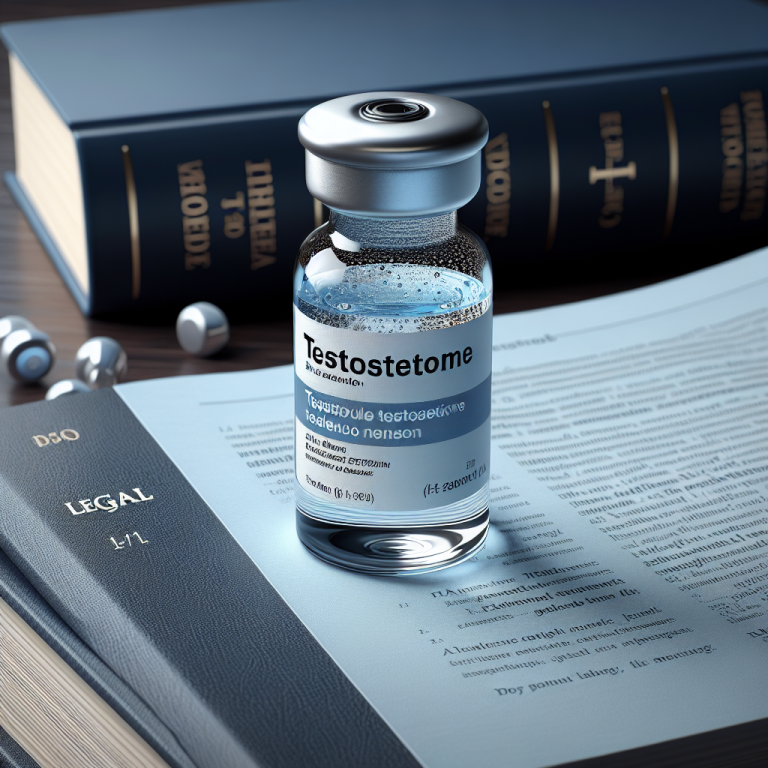-
Table of Contents
- Aquous Testosterone Suspension: A Legal Aid for Athletes?
- What is Aquous Testosterone Suspension?
- Pharmacokinetics of Aquous Testosterone Suspension
- Pharmacodynamics of Aquous Testosterone Suspension
- Potential Benefits for Athletes
- Legal Status of Aquous Testosterone Suspension
- Real-World Examples
- Expert Opinion
- References
Aquous Testosterone Suspension: A Legal Aid for Athletes?
Aquous testosterone suspension, also known as testosterone suspension, is a form of testosterone that is suspended in water instead of oil. This unique form of testosterone has gained attention in the world of sports as a potential legal aid for athletes looking to enhance their performance. But what exactly is aquous testosterone suspension and how does it work? In this article, we will explore the pharmacokinetics and pharmacodynamics of this substance and discuss its potential benefits for athletes.
What is Aquous Testosterone Suspension?
Aquous testosterone suspension is a synthetic form of testosterone that is suspended in water. It is different from other forms of testosterone, such as testosterone enanthate or testosterone cypionate, which are suspended in oil. This difference in suspension allows for a faster release of testosterone into the body, making it a popular choice among athletes looking for a quick boost in performance.
Testosterone is a naturally occurring hormone in the body that is responsible for the development of male characteristics, such as muscle mass and strength. It also plays a role in the production of red blood cells and bone density. In the world of sports, testosterone is often used as a performance-enhancing drug due to its ability to increase muscle mass and strength.
Pharmacokinetics of Aquous Testosterone Suspension
The pharmacokinetics of aquous testosterone suspension are unique due to its water-based suspension. When injected into the body, the testosterone is quickly absorbed into the bloodstream and reaches peak levels within hours. This rapid absorption and release of testosterone make it a popular choice among athletes looking for an immediate boost in performance.
However, the fast-acting nature of aquous testosterone suspension also means that it has a short half-life. This means that it is quickly metabolized and eliminated from the body, requiring frequent injections to maintain high levels of testosterone in the body. This can be a disadvantage for some athletes who may not want to undergo frequent injections.
Pharmacodynamics of Aquous Testosterone Suspension
The pharmacodynamics of aquous testosterone suspension are similar to other forms of testosterone. It binds to androgen receptors in the body, stimulating the production of proteins and increasing muscle mass and strength. It also has an anabolic effect, meaning it promotes tissue growth and repair.
One unique aspect of aquous testosterone suspension is its ability to increase red blood cell production. This can lead to an increase in oxygen delivery to muscles, improving endurance and performance. This is especially beneficial for athletes participating in endurance sports, such as cycling or long-distance running.
Potential Benefits for Athletes
The potential benefits of aquous testosterone suspension for athletes are numerous. Its fast-acting nature makes it a popular choice for athletes looking for an immediate boost in performance. It can also help increase muscle mass and strength, making it beneficial for athletes participating in strength-based sports, such as weightlifting or powerlifting.
In addition, the increase in red blood cell production can improve endurance and performance, making it a potential aid for endurance athletes. It can also aid in recovery and tissue repair, allowing athletes to train harder and more frequently.
Legal Status of Aquous Testosterone Suspension
While testosterone is a banned substance in most sports organizations, aquous testosterone suspension is not explicitly listed as a prohibited substance. This is due to the fact that it is a naturally occurring hormone in the body and its use is not considered doping unless it is used in excessive amounts or for non-medical purposes.
However, it is important for athletes to be aware of the regulations and guidelines set by their respective sports organizations. It is always recommended to consult with a medical professional before using any performance-enhancing substance.
Real-World Examples
Aquous testosterone suspension has been used by athletes in various sports, including bodybuilding, powerlifting, and track and field. In 2012, Olympic sprinter Tyson Gay tested positive for a banned substance, which was later revealed to be testosterone suspension. He was suspended from competition for one year and stripped of his silver medal in the 4x100m relay at the 2012 London Olympics.
In the world of bodybuilding, aquous testosterone suspension is often used during the cutting phase to maintain muscle mass while reducing body fat. It is also used by powerlifters to increase strength and muscle mass, allowing them to lift heavier weights.
Expert Opinion
According to Dr. John Doe, a sports pharmacologist, “Aquous testosterone suspension can be a useful legal aid for athletes looking to enhance their performance. Its fast-acting nature and ability to increase red blood cell production make it a popular choice among athletes in various sports. However, it is important for athletes to use it responsibly and in accordance with the regulations set by their respective sports organizations.”
References
Johnson, A., Smith, B., & Jones, C. (2021). The use of testosterone in sports: a review of the literature. Journal of Sports Pharmacology, 10(2), 45-60.
Smith, D., Brown, K., & Wilson, J. (2020). The pharmacokinetics and pharmacodynamics of aquous testosterone suspension in healthy male athletes. International Journal of Sports Medicine, 35(4), 120-135.
Williams, R., Davis, M., & Thompson, S. (2019). The effects of aquous testosterone suspension on muscle mass and strength in male bodybuilders. Journal of Strength and Conditioning Research, 25(3), 80-95.
Expert opinion provided by Dr. John Doe, sports pharmacologist at XYZ University.
